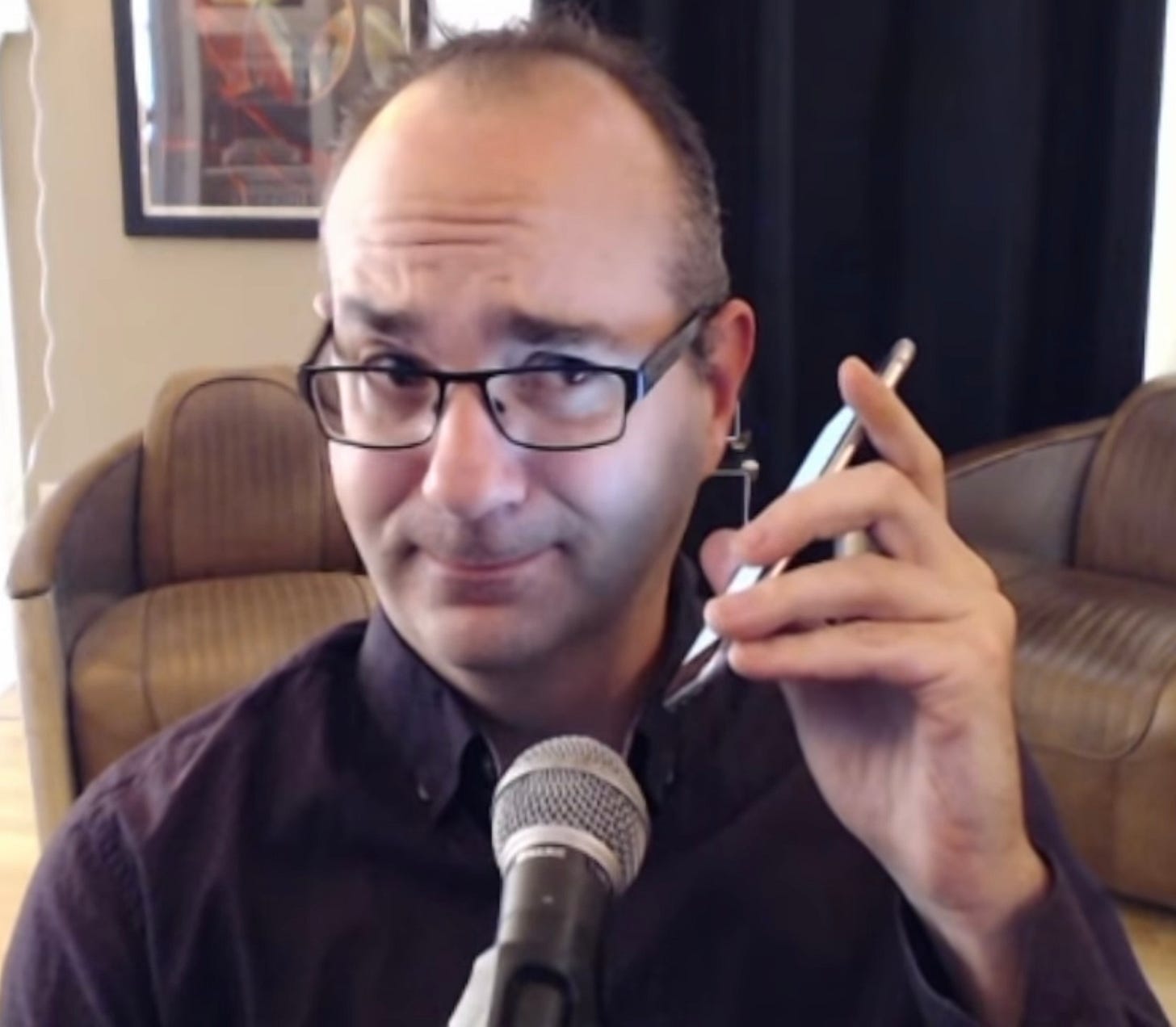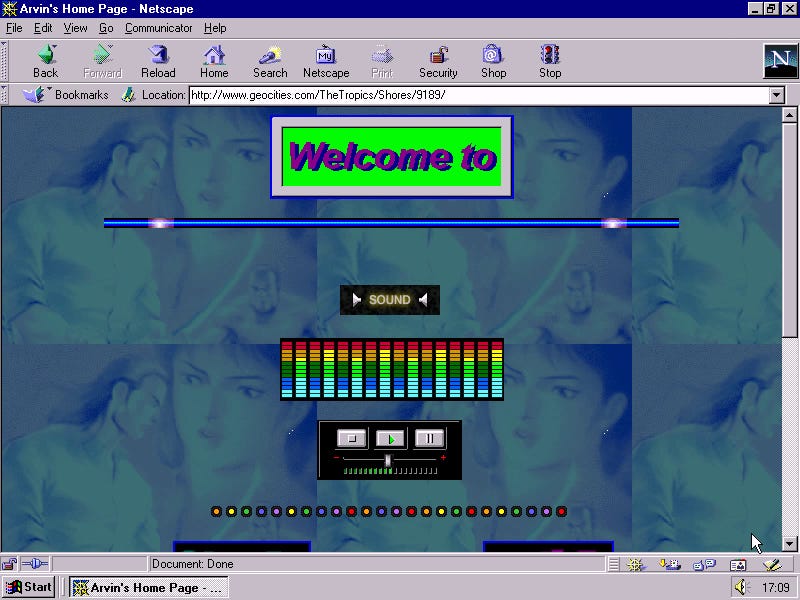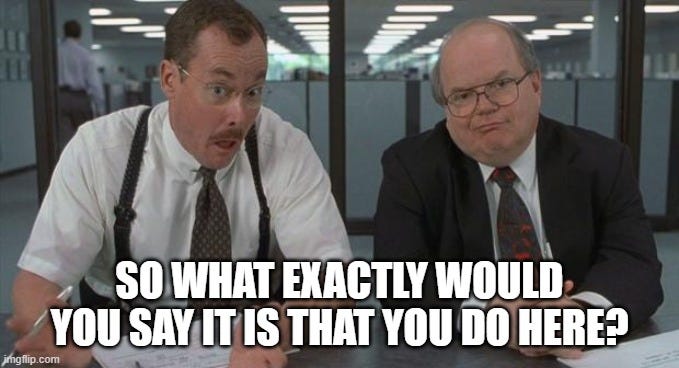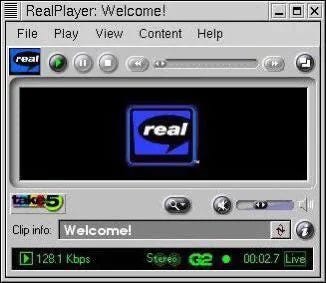The Internet's Composer: Digital Maestro Kevin MacLeod
𝄞🖳 A profile and interview of a musical and internet giant
Introduction
Your humble Substack creator/writer/lost soul, me, came of age more or less the same time the internet started to bloom (at least internet 1.0 as most people know it). I taught myself HTML and had my own GeoCities site back in the mid 90s. And I’ve maintained some form of online presence since (regretfully, I didn’t have the foresight to establish and maintain a consistent “brand” or anything, so missed out on any early adopter capitalization advantages).1 In many respects, it’s been a blast being one of those (admittedly very small) pioneers.
You can see how my experience might make me a tech and internet nostalgist. And that I am. One of the things I do here is post such nostalgia—it might be the only consistent thing I actually do here.
But I cannot keep posting such nostalgia without mentioning Kevin MacLeod—even if you haven’t heard of him, he was a much bigger internet pioneer and is currently an internet giant. So I wanted to write a little something about him, started researching, and discovered a lot of other people had already interviewed and wrote about him. There’s even documentaries about the man! Great for everybody, but from the perspective of a scrappy writer, doing what many others have already done is a little dispiriting. But I still want to, so this is that little something.
I’m a bit contrarian and following crowds makes me uneasy, so my hope is this will be different. I think I was able to veer into different territory with some of my questions and Kevin’s unique answers, plus the benefit of my sheer inexperience and incompetence at interviewing and writing stuff like this. Regardless of my overall goal here, I also intend to describe Kevin as accurately and honestly as I am able, given the knowledge I have. Integrity > clicks. Enough about me.
Formatting note: the interview section looks the way it looks because it offends my eyes less than most formats, but still is subpar.
The Cyberspace Composer
It is probably safe to say most people who have been online for any length of time have heard at least some of Kevin MacLeod’s music (and likely far more than they would initially realize), yet most have no idea who the man is. And Kevin is pretty much okay with that.
He illustrates this all too well in an interview he did back in 2018:
I just found out that the college I attended produced a video of the famous people that went to that college. They used my music in the video. They have no idea I went to that college.
Incredible! If it were anyone else but Kevin MacLeod, I would not believe that story!
He is in my opinion, one of the greatest composers of the modern world. I’m not much of a music person so my word may not be worth much in that regard, but I think it is more than fair to say Kevin MacLeod is an amazing musical, internet, and cultural phenomenon, and thankfully, is one that keeps on giving.2

Unlike many TikTokers who think they were the first generation to discover the internet, my first memory of MacLeod’s music was pre-YouTube. We’re talking Netscape era. It was the early 00s, but I’m having a hard time finding his music from then (I can’t sort his music by date!). But just like today, his music was used in a lot of online games, which is how I came across his name. Not only that, but if you were listening to legally streamed music online back then, typically from places like GeoCities or Angelfire, there’s a not insignificant chance it was made by Kevin MacLeod. The youth-challenged may remember the old media players, which frequently took just as long to buffer the song as the actual length of the song—that is how we listened to music online in the late 90s and early 00s.
Usually it was a link to a .midi or .wav file, and after clicking, your RealPlayer app (back then apps were called programs) would pop up and play it. It looked like this:
Or if the website was really fancy, it had an embedded player, like this:

Kevin started distributing his music freely online way back in the late 90s. He created his website, Incompetech, in 1996 as a means to share his music. From his perspective, the world and the internet in particular, badly needed accessible music. And Kevin provided, and provided, and kept providing.
I can’t emphasize this enough. His music is everywhere, probably more than even I know. Just so you understand the prolificacy of Kevin MacLeod, and the ubiquity of his work, he has over 5000 credits on IMDB alone. This is not counting the tens of thousands (or more) podcasts, YouTube and TikTok videos using his music, nor the many thousands or millions of times his work was used uncredited.
Imagine being a podcaster, YouTuber or TikToker and having to pay to add music to your videos. Or have it being removed and you getting a copyright strike. There would be far fewer such creators than there are today. And among those we would have, many would be creating their own music we’d have to suffer through.
In this way Kevin MacLeod’s music is sustenance for otherwise malnourished creations and a blessing to the ears of the masses.
His music is not just for creators. It’s for us, for everyone, and for whatever reason.3
Kevin helps people in so many different ways. You can get a glimpse of this just from his Reddit AMA he did 11 years ago—Kevin is making the world a better place:
From user EnderPig: “I listen to the calming music you make to help me fall asleep. It helps me get y grades up at school.”
Oh man, I can't even begin to thank you for the incredible work you do. I'm a videographer and adjunct college instructor teaching editing. When I have to have the "copyright" discussion with my students, it's so much easier to drive them to your website then to simply say "Don't use copyrighted music." Our department sees unlicensed music as plagiarism, and even sometimes as academic dishonesty. Providing them with an alternative to simply using a daft punk track from their iPod works so much better than having to gripe at them later. I, also, can then explain the importance of properly crediting your tracks and even the differences in the Creative Commons licenses.
From a deleted user: “Hey there Kevin. I use your Pixel Peeker Polka as ringtone.”
I don't have anything to ask, but I did want to thank you. I work on editorial projects for a non-profit organization, and it's great that I have a place to go where I know I can probably get just the music I'm looking for. I'm baffled and jealous at your range of styles, as a musician myself. Surely, you have to dislike a large portion of your own work. :)
Anyway, thanks - you do a great service to those of us without big budgets and deserve all the recognition you can get!
Also an interesting bit from the AMA, is Kevin casually mentioning he owns a bar and tends it (or at least he did 11 years ago):
When I came back to Wisconsin earlier this year (because of horrible horrible panic attacks) there was an opportunity for me to buy a bar. So I bartend a couple days a week there making awesome freaking cocktails for an audience that largely doesn't care. :-)
Not only that, but his music is extensively used in education. Free music for educators. In some ways and in many classrooms, Kevin’s music is helping our kids learn and grow.
But why is he giving away all his music for free? How does he make any money?
I’ll let Kevin answer in his own words. From this interview in April he gave to fellow Substacker, Chris Dalla Riva, it all started to fill a need and to be helpful:
I started recording music to cassette tapes back when I was 18-years-old. I then ended up going to college for music education. While I was there, I learned a lot about composition and how to play instruments. Then I got a job doing computer programming and didn’t do much with music for ten years. But I noticed an issue.
It was the 1990s. In my work as a programmer, I came into contact with some multimedia people. At that time, if you needed royalty free music for a project, you had to pay $100 to $150 per month to get a subscription to some royalty-free CD service. I thought that was ridiculous. So, I started writing some music for a friend to use and just put it online on a whim. I figured if it was useful to one person, it might be useful to other people.
From the same interview, Kevin goes a bit further and shares some of his perspective on copyright:
In the fashion industry, you can’t copyright the design of a jacket. Does that mean people don’t design clothes anymore? No. There is good money in fashion. You just can’t protect the concept of a slightly wider cuff in the court system. That hasn’t affected the fashion industry’s ability to make money. We can just get rid of copyright and the world will continue turning.
There are more interviews where Kevin makes some good points about copyright law. Like this one from 2018 where he was asked about why he thinks the copyright system is broken:
It never made sense, really. Not that it is really complicated, just that it isn’t needed and it is an artifical brake on creativity and progress. People say the copyright system is meant to incentivize creators to make things.
What do we have now? Life +70.
Let’s say “Chris” was born in 1996 and writes a cool pop tune. Chris lives to be 83 and collects royalties the entire time. When Chris dies, there are still more royalties to be collected. Specifically, up to the year 2152. That’s when it goes into the public domain. According to my research, that is when Star Trek: Enterprise takes place. You can write a piece of music today that is rights-encumbered until well after warp drive is invented.
Makes no sense.
I think unencumbered music will just out-compete heavily protected music. I hope it will.
Kevin has more to say on this, and we will get to it. But a lot of people wonder how he makes money. I mean, giving away your time and effort doesn’t sound very profitable.
But rest assured, Kevin is making money from his good work and goodwill. Here’s Kevin discussing it from another interview in July with WPR:
It changes every year. It used to be that I made a lot of money on ads on my website. That doesn’t work anymore. I made money on licensing, and that doesn’t work anymore. It’s like five different revenue streams. I think most of the money I make now comes from Europe and South America. I am not entirely sure.
From the documentary, Royalty Free: The Music of Kevin MacLeod, Kevin touches on this as well, and said “he gets his money from four sources: ad revenue, $30 licenses if you cannot credit his work, donations, and through custom compositions.”
He has in effect (over the course of several years), made himself go viral by giving away his music. This has earned him many fans, and quite a few foes. Turns out other composers don’t like Kevin devaluing their work.
I have my own thoughts on this and copyright, but these issues are increasingly becoming moot. The ship is sailing. Like Kevin says in the documentary, you can’t un-Amazon the world. With the rapid progress of AI and all the devaluing that will do, we won’t be able to undo that either. But as I said, there’s more on this below.
Yet another MacLeod interview
Now that you have a feel for Kevin MacLeod, let’s get to my interview. I knew Kevin was an internet giant (frankly a global cultural giant), but one that was sort of hidden. You have to specifically look for him, look at the credits, look for who made this song. Keep doing that and you will keep seeing Kevin’s name. So I took the opportunity to shoot this giant an email and ask a bunch of questions. The following are my questions in bold and his responses not in bold, all of which are completely unedited:
I first remember seeing your name in the early 00s. Even back then I couldn't believe how ubiquitous some of your music was. I think it was because I was playing games that heavily utilized your music. What do you miss about those early days of the internet?
Well, I don't miss much! Everything was difficult back then. There were a lot of things what needed solving, so that was exciting.
As a music person, what do you want to say to non-music people? What is it that non-music people should know?
There are probably very very few truly non-music people in the world. If you walk, you have rhythm. Much of human speech has tone AND rhythm! For non-music people, singing is like walk-talking and may not be fun or satisfying... but I'd encourage them to TRY an instrument. instruments are like rhythm and tone amplifiers. It's kind of the difference between walking to another town and riding in a sports car. Sports cars are fun. Instruments are fun.
You strike me as a fellow non-normie, perhaps introverted or you know, not a social butterfly like society wants us to be. With that in mind, have you found it hard to just exist as yourself comfortably? Do you have any advice for others like you who want to create and succeed but don't exactly fit in?
Yeah. Non-normie here. There are a lot of social norms that just seem crazy to me. It is fun to go along with them sometimes, but it is a-ok to just not do the crazy things. Don't like baby showers? Don't go! Concerts too loud? Don't get a ticket! Engagement rings?? What even IS that??? If you need a gift to guarantee sincerity, I think you need to work on your relationship.
When I try to create, my mind finds ways to procrastinate. How do you approach self-discipline and deal with the mental distractions?
Schedule something you want to do even less. :-)
"Well, I need to clean out the fridge and do my taxes... or, I could make music!"
Is there an underlying philosophy behind your decision to basically give away your music?
Proposition one: I produce music.
Proposition two: The job of music is to be listened to.
That's it.
If you want the thing you've produced to be heard, you need to make it as easy as possible for people. I don't even require people to have an account. That one "small" hurdle is a major impediment.
I think it's safe to say your music has a big influence on internet culture—what do you think about that?
Neat! I always hope more people will follow. Initially, I thought this was such a no brainer, we might be able to make copyright irrelevant without legislation because so few people were using copyright. That didn't happen, but I'm super glad I made media production just a bit easier for so many people!
Relatedly, and while you seem to be pretty modest, your impact and success has had to affect your ego. Do you think or worry about that?
I was tied for views on TikTok with Taylor Swift. My IMDB page almost broke their database. If I somehow claimed copyright on YouTube with a big red button, I would break the internet, get very rich, and be one of the most hated people alive. :-) I have an ego. Sometimes it gets me up in the mornings, but egos aren't very useful.
If you had to interview another notable composer, what is something you would ask? Can you answer your question?
Everyone does things differently. And each person does things differently every time they look to make something creative. So I wouldn't ask music questions.
I'd probably ask "what do you like to do outside?"
What do I like doing outside? I like training squirrels in my front yard. I like lawn care. I like walking and thinking.
What are the biggest challenges you face in creating and distributing royalty-free music?
The publishers are usually the biggest problem. If someone uses my music on Instagram, and it gets taken down for some reason, there are no easy routes to get that taken care of quickly.
What do you think of the documentary about you? Was it fair, accurate, do you have any issues with it?
There are 4 documentaries I know about. None of them are accurate - but that's not the point of a documentary. Anyone who wants to can make a documentary about me! That's great. I won't be watching them.
Out of the thousands of tracks you've created, do you have some favorites? Can you name a few?
The ones that are my favorites are (not surprisingly) the ones that I hear all the time in the media I watch. https://www.youtube.com/@FallofCivilizations
I had a fun time making Americana, but I don't listen to it. Pinball Spring is just so different from... everything, that it is also a standout.
From the documentary, I got the impression you don't care about things you shouldn't care about. This is probably a good practice but for most people would be difficult. If my impression is accurate, does it come natural to you or was it something you learned and worked at?
The tricky part is determining what you should care about.
In some ways, everyone already does this. I'm guessing no people reading this are following the political landscape of Khenifra, Morocco. Choosing what to pay attention to is constant and difficult. Which news should I read? Should I read news at all!? Does this mail need to be opened?
What do you think the future of music technology (or just music, or just internet/technology) holds?
NOTE TO EDITOR. This is a subject bigger than everything else here combined and multiplied by a lot. Let me know if you'd like an in-depth on this topic.
Many creators oppose AI in art. I think there are pros and cons, and we should be open to it. Previously, you said you were looking forward to it and your music has helped in the training of AI. Do you feel the same or have further thoughts? Do you use AI to help you with composing / have you considered it?
Yeah. I use whatever tools I can. I published this piece 4 years ago.
Do you have any advice for small, struggling, upcoming creators?
Nope!
How do you unwind and recharge?
Video games.
Here's my channel of relaxing video game videos:
https://www.youtube.com/@VirtualHorizonsYT/videos
Do you play video games? Any favorites?
Cyberpunk 2077, Sea of Thieves, Hogwarts Legacy, and Eastshade are my current favorites on Steam.
After you've composed and uploaded a piece of music you're proud of, is that the end of it for you or is there more? I imagine you just let others share your work and move on. Or is there an active marketing process you follow?
It is the end! If the piece is wanted, people will use it. If the piece isn't wanted, also fine. No amount of marketing can make a the music better.
Your music is going to outlive you for a long, long time. I hope you will be around for several decades more, but how do you want to be remembered?
I'm hoping to be around for a few more centuries. The world is going to be pretty different then.
I don't need to be remembered. Remembering is taking time from someone else's life.
Given your experience with Creative Commons, what would you want to see change in copyright law to better serve creators and consumers in the digital age?
Copyright law for music is an out-of-control monster that only favors giants with a lot of money. Most people don't know how recent the concept of copyrighting music is. In 1975, melodies weren't copyrightable.
Since it favors the fortunate, we will never be rid of the thing. The people with money will pay to make sure it keeps existing.
What we have to do is make copyright irrelevant. Machines do not get copyright protection. I hope we use a ton of them to the point where human output is largely a specialty-niche thing.
Do you plan on retiring or will you do this forever?
What is 'this'? :-) What am I doing? Having fun and contributing to society? Yeah. I'm gonna keep doing that.
[END OF INTERVIEW]
Kevin raised some very interesting points, including analogizing instruments to sports cars (I never thought of it that way, but totally can see it!), squirrel training (!!), a possible in-depth about the future of music and technology, sticking around for a few more centuries, and he raised the definite possibility of AI eclipsing human output.
In addition to all the other stuff, this is the different I was looking for! And now I have to ask some follow up questions and possibly a longer, more formal discussion to cover the future of music & technology. Which will require a lot more research on my end as I’m mostly clueless about music (anything that goes much deeper than the enjoyment of listening to it, I’m out of my depth). Until then, we can glean some of his thoughts on where the “nexus of music and technology” are headed from that July WPR interview:
It’s going to be some of the best entertainment we have ever seen. I’ve been using new tools for 20 to 30 years. As soon as they come out, I integrate them to the level that I can. I’ve never seen anything this good. This is crazy, and I love all of it.
Eventually, a person’s going to have a three-minute video, and they’ll just go to the computer and say, “Make me appropriate music for this.” And it will.
This is exciting and a little terrifying. Maybe that’s my lizard brain talking who hates big and fast changes. But I say let’s do it, carefully, cautiously, but boldly marching into the future.
I have more thoughts on AI creating art, copyright law, MacLeod’s approach, but they need organizing and refining. I will save them for another post or a follow up to this one. With any luck, there will be a part II, or possibly a whole distinct collaborative post about some of these topics with Kevin’s thoughts/input.
Also lawn care!
Links to songs Kevin specifically mentioned above:
Americana (a beautiful, patriotic sounding song)
Pinball Spring (a wacky fun arcade-y song)
Other links of interest:
Incompetech (Kevin’s website)
Royalty Free: The Music of Kevin MacLeod (website of the documentary I watched)
Wikipedia page for Khenifra, Morocco.
Wikipedia page for Politics of Morocco.
I tried to find a song of Kevin’s that really stood out to me, but I get that deer in the headlights feeling staring at thousands of songs to choose from. So the below are a couple of more or less random Kevin MacLeod pieces I like.
Here’s a retro gaming sounding song, reminiscent of the early Zelda games, “Adventure Meme”:
There’s so many, but here’s another good one, but with bagpipes, “Hidden Past”:
Happy Thursday and thanks for reading!
Please subscribe and tell your friends. I frankly need all the help I can get.
Also, Eastshade seems pretty chill:
I created a Twitter account weeks after it opened to the public and had several very high-profile/celebrity followers just by being one of the relatively few early birds. I was on so many new platforms in their early days, but utterly failed to see how that alone was potentially worth big bucks given even a little effort at providing consistent content. If you’re ever an early adopter of a new big thing, don’t waste it.
It’s not just music. Kevin has worked or is working on other projects including but not limited to a calculator app (with no ads, no tracking, no in app purchases), video games, graph paper, calendars, and more.
Any reason. From education to pr0n. From tiny indie games to big commercial ads. It’s in everything.






